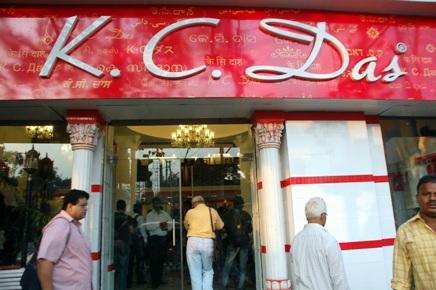
The rasogolla is to the Bengalis what pao bhaji is to the Maharashtrians. It is an intrinsic part of any Bengali's life.
In West Bengal, almost every event, big or small, is rounded up with this sweet wonder.
Cottage cheese balls boiled in sugar syrup have wooed gastronomes across the world for years and rasogollas have gradually become a global name.
We recently paid a visit to one of the retail outlets-cum-restaurant run by K C Das, the company that played a significant role in granting the rasogolla international status.
It is the first Indian company that canned rasogollas and sent them abroad and thereby helped the Bengali sweet earn a place on the world cuisine map.
Here is a brief account of how K C Das made it big with rasogollas, among many other food items.
. . .

Humble beginnings
In a tiny, obscure corner of Bagbazar in North Kolkata, Nobin Chandra Das set up a sweet shop way back in 1866.
But he never wanted to run a mere sales counter.
The passion to create something new haunted him.
His ambition was to create an original sweet that would bring new excitement to the Bengali palate.
He toiled for months and wanted to make small balls of cottage cheese, boiled them in hot sugar syrup.
But time and again as he tried to put the casein balls in sugar syrup, they disintegrated.
At last, Das discovered the presence of an enzyme in the casein that played the trick.
The result was a succulent, spongy sweet with a unique, distinctive taste.
Das christened it 'rasogolla'.
History was made.
. . .
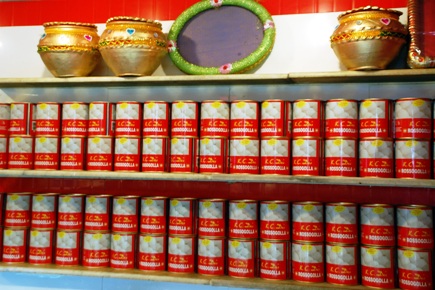
The popularity curve
In no time, rasogollas struck a chord with sweet-loving Bengali palate and earned for Das the epithet 'Nobinmoira' (the Columbus of rasogolla).
Once, a wealthy timber merchant, Raibahadur Bhagwandas Bagla, was travelling in his carriage with his family.
One of Bhagwandas's children was thirsty and the carriage stopped close to Das' shop. Das gave the little boy water and a piece of his invention, the rasogolla.
The child loved the sweet very much and offered a piece to his father.
The latter was equally ecstatic.
The merchant bought a large quantity of rasogolla for his family and friends.
Das and his invention became famous in no time.
Das left his legacy to his son Krishna Chandra (1869-1934).
In 1930, Krishna Chandra started his first shop, 'Krishna Chandra Das Confectioner' with his youngest son Sarada Charan.
. . .
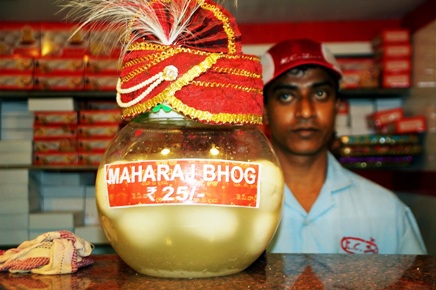
The who's who of Bengal loved Das's creations
When Maharani Swarnamoyee Devi, the dowager of the house of Cossimbazar, complained that there were no more sweets to excite her, Das whipped up a confection that made the old lady exclaim, 'aabaar khabo' (I want to have it again).
Das's confections were hot favourites with the monks of then new-born Ramkrishna Mission.
Rakhal Maharaj (Swami Brahmananda), the first president of the mission and a close friend, confidant and guide of Swami Vivekananda, loved the fares offered by Das.
The 'dedo' sondesh was a particular favourite of Sri Maa (consort of Sri Ramkrishna).
Dr Pashupati Bhattacharya, a renowned medical practitioner of Bagbazar, would always buy Nobin Das's rasogolla before visiting Rabindranath Tagore.
. . .
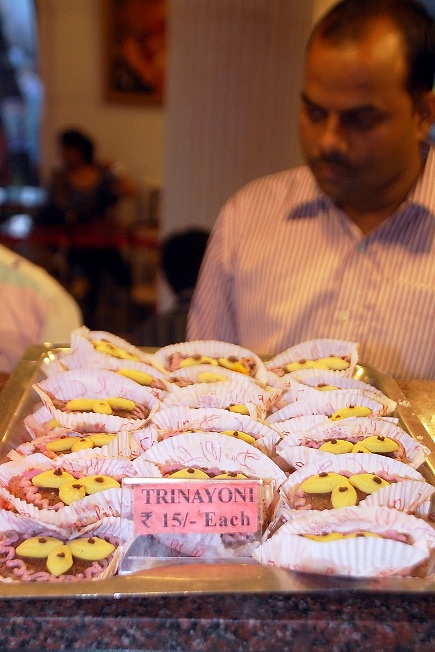
Sales and marketing
"It feels great to be working with a group that made rasogollas a world famous concept," Atanu Bhattacharya, store manager of K C Das's Esplanade East branch, told rediff.com.
In Kolkata, KC Das' main outlet is at 11 A & B, Esplanade East. Its other outlets in the city are at Shyambazar, Lake Town, Rash Behari Avenue, Big Bazaar Sealdah, Big Bazaar Salt Lake, Pantaloons Orchid Point Kankurgachhi.
It also has quite a few outlets in Karnataka.
Employing about 500 people, the company's annual turnover stands at Rs 20 crore (Rs 200 million).
On an average, the company's Esplanade outlet-cum-restaurant, which has recently been renovated, see 2,500-3,000 footfalls daily.
"Constant innovation and impeccable quality have been our USP over the years," Bhattacharya told rediff.com.
. . .

These two qualities have helped the company sell its products in various parts of India as well as in East Europe, Central America, North Europe, West Asia, South America, South/West Europe and North America.
However, the exports division has been reeling under an acute shortage of quality cans, Dhiman Das, one of the directors, told rediff.com.
"We have temporarily stopped the export and have been negotiating with dealers of cans to counter the problem.
"We do hope to have a breakthrough soon," Das said.
. . .
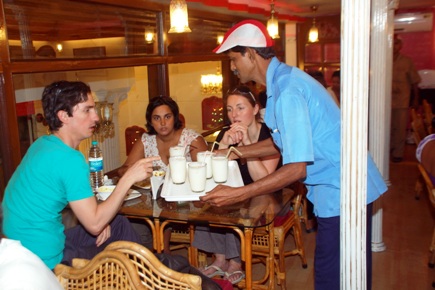
Research and development
Sarada Charan Das gave a research and development perspective to the company's activities.
In 1947, he set up a fully equipped laboratory, the Indian Scientific Industries, at Chitpore Road in Kolkata.
Research work there involved the bacterial culture required for 'dahi'.
It also worked on the nutritional value of whey, and ways to package and market it as a soft drink.
Commercialisation of lactose and lactic acid from whey was another project taken up by the laboratory.
"Two of our newest products: 'trinayoni' (resembling three eyes of Goddess Durga) and Maharaj Bhog (a jumbo-sized rasogolla worth Rs 25 apiece) are fruits of relentless labour by our researchers," Bhattacharya informed.
. . .
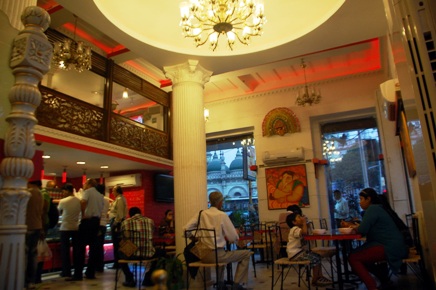
The Department of Science and Technology, government of India recognised the company's in-house R&D laboratory in Bengaluru.
This laboratory is affiliated to the Bangalore University and provides a platform for the postgraduate students of universities across the country.
Products that make the mouth water
The most famous products of the company are canned rasogolla, rasomalai, gur rasogollas, chhanar payesh, keshar rajbhog, amrita kumbha, rasomanjari, khirmohan, rasomadhuri, chhanar tost, khirkadam, ananda bhog, prabhu bhog, khirkadam, chom chom, ananda bhog, prabhu bhog, sonpapri, golapi pera abarkhabo, baikuntha bhog and many more.
. . .
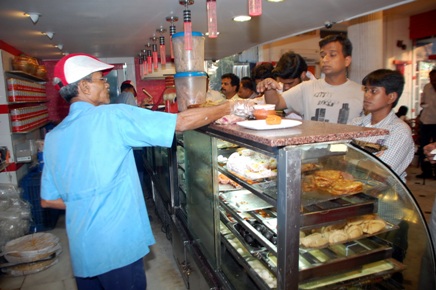
For the diabetics, the company has on offer canned rasogollas for diabetics, sondesh for diabetics, etc.
In the namkeen section too, there is a wide variety to choose from: veg patties, singara, chanachur, chhanar chop, dhakaiparatha, nimki, dalmoot, soya roll, peas kachori with aloordum and matar paneer.
An eye to the future
"We, at K C Das, are constantly experimenting and making new products. We are trying to blend the old and new, the traditional and modern," Bhattacharya told rediff.com.
"We take pride in the fact that even in this age of fast food and multinational platter, we are being able to draw people to the age-old Bengali sweets and snacks," he said.
"At our laboratory, our researchers are working at length to come up with newer products, mixing the old with the new," Bhattacharya said.
"Secret of our success lies in our unvarying endeavour to rise to the international standards," he added.